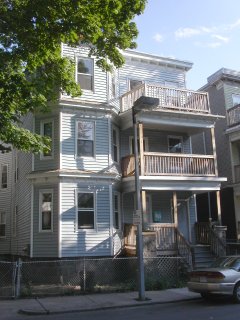This article from the NYTimes discusses the phenomenon of distressed triple-decker properties in New England (see below for photo) - a form of architecture that I've always found very charming on my trips to Boston and Providence. In Boston they make up 21% of foreclosures even though they're only 14% of the housing stock, and the story is much the same in Worcester, New Bedford, Providence, and other New England cities.
It's easy to see why these properties saw their prices inflated and are now easy victims of abandonment or foreclosure. When times were good they were highly attractive to speculative investors who either lived in one unit while renting out the other two (often highly-leveraged with an FHA loan) or those who built hands-off portfolios of poorly-maintainted triple-deckers that were easy to walk away from as property values fell over the past couple years. Simple three-unit properties like these appealed to investors because they're small enough to manage easily, but big enough to generate consistent cash flows. In many neighborhoods of Philadelphia much the same thing happened with rowhomes although the fact that they appeal as much to average owner-occupants as to investors gives them a bit more cushion from the distress seen with triple-deckers that often traded from one absentee landlord to another and are now up against a wall as investors shy away from the market.
One great thing to come from New Enland's 'Triple-Decker Dilemma' is a realization from the Boston government that the glut of foreclosed and abandoned triple-deckers presents a great opportunity to create a large volume of affordable housing at a relatively low cost. I was especially encouraged by this quote from Evelyn Friedman, director of Boston’s Department of Neighborhood Development, which shows an unusual degree of pragmatism for a local government official: “If we have four three-deckers on 12,000 square feet and could only get two on that amount of land now, we are losing six units. So it’s very important to us to sustain them.” She's referring to the fact that Boston's current zoning laws would never allow new housing to be built as densely as the triple-deckers were, so it's better to renovate them and maintain that density of affordable housing than to build new housing at lower density which would destroy a signifcant portion of the city's highly in-demand affordable housing stock. This pragmatic approach to side-stepping outdated zoning codes is a great example of a city government turning lemons into lemonade and provides a good framework for thinking about new building vs. restoration in many older cities.


Comments(0)